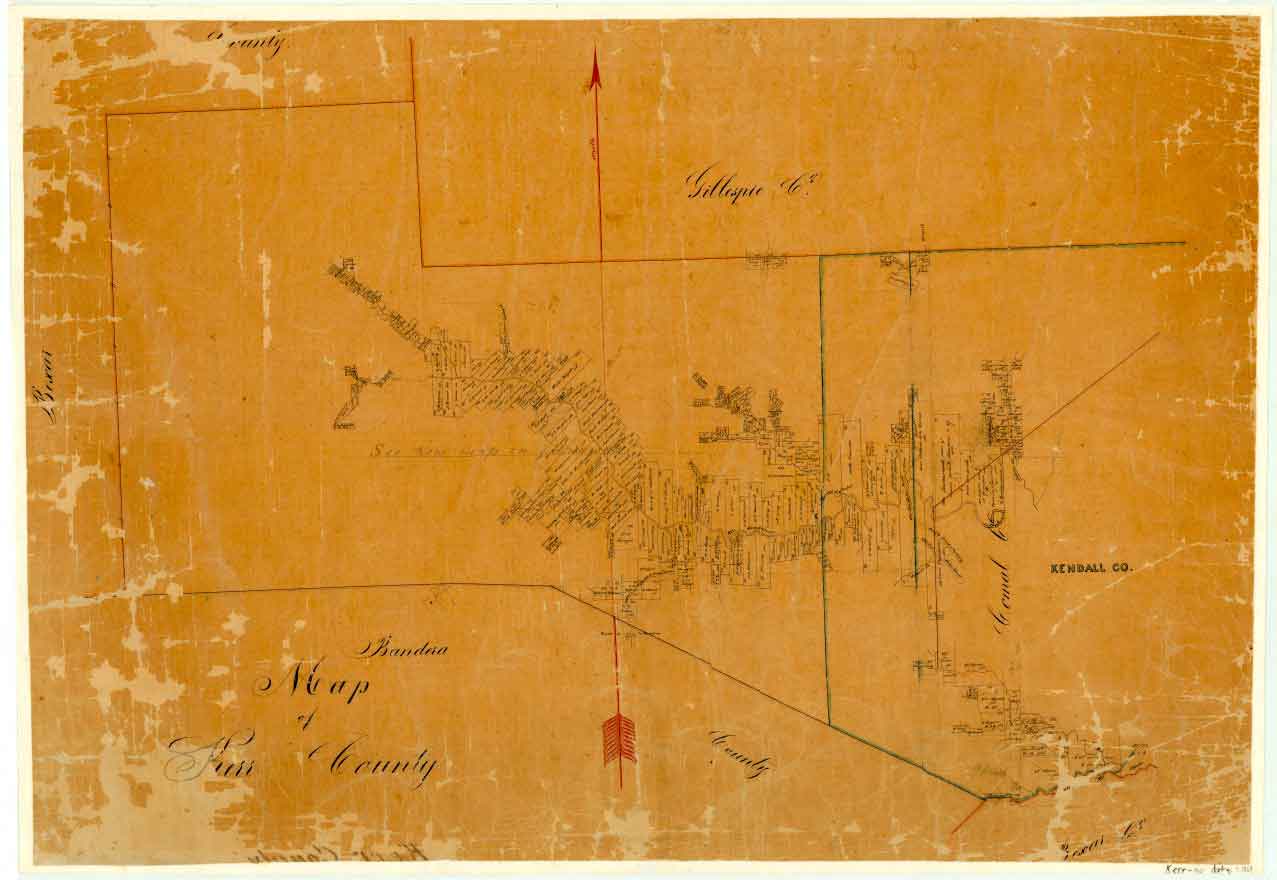 |
| Our part of Texas before Kerr County was created. Click on any image to enlarge. |
There is a persistent story about how Kerrville got its name – but is it true?
"Joshua Brown, the founder of Kerrville, convinced the very first Kerr County commissioners court to make the county seat; Brown wanted the town to be called ‘Kerrsville’ after his friend Major James Kerr.”
 |
| James Kerr |
Yet the other part, about how Brown wanted the town to be named for his friend – that part might be lore.
Joshua Brown arrived here in the late 1840s, leading a group of ten men to build a shingle makers' camp beside the Guadalupe. Their plan was to cut down cypress trees, slice the trunks into disk-shaped slabs, then carefully spit those disks into rough shingles which could be further shaped by hand. The finished shingles were then hauled to market, most likely in San Antonio. It was hard work for little pay.
Neither Brown or those with him owned the land where they camped. The ground beneath them had been awarded by the State of Texas to Benjamin F. Cage. The grant read “the grant is made in consideration of Benjamin F. Cage having fought in the Battle of San Jacinto the 21st of April 1836.”
Joshua Brown bought the land which became Kerrville in 1856 from the stepsons of Cage's mother -- Cage was thought to be dead at the time of the sale, though there is some evidence he was quite alive and well and living near Blanco. And Brown bought the land at about the exact same time Kerr County was being organized.
So – how did Kerrville get its name? Turns out there is a paper trail.
 |
| Potter, Joshua and Sarah Brown |
Here's how it happened:
On November 12, 1855, "Sundry citizens from the 70th district of Bexar County" petitioned the state to create a new county.
"We, the undersigned citizens residing on the Guadalupe River and its tributaries in the counties of Comal, Bexar, Gillespie, laboring under great embarrassment, owing to the remoteness from their respective county seats, and having a sufficient population to justify it, we respectfully petition for the formation of a new county so that the Guadalupe River may be central in passing through it, to include such limits and territory as your honorable body's wisdom may seem proper and reasonable."
Below were affixed over 85 names, including Joshua Brown's. I recognize quite a few of the names, like J. M. Starkey, who was an early millwright, or Fritz Tegener, who was a leader of the Unionists during the Civil War, and who barely escaped the Battle of the Nueces. There are some Burneys, some Ridleys, a Stieler, and even the first head of Kerr County government, ‘Chief Justice’ Jonathan Scott. Descendants of many of the original petitioners still live in our county.
Nowhere in the petition does it request the county be named for James Kerr.
As the bill progressed through the legislature, a provision was made that the county seat be selected by the inhabitants. The final bill called for the county to be named for James Kerr, "the first settler on the Guadalupe." James Kerr had settled on the Guadalupe near the Gulf of Mexico in the 1820s.
However, the bill also specified the county seat "shall be called ‘Kerrsville’ unless the site selected shall already have a name."
 |
| Kerr County, around 1869 |
Likewise, the county commissioners did not choose the name, despite Joshua Brown's friendship with James Kerr; the Texas legislature named the community. Whether Joshua Brown had influence over the naming of the county or county seat I cannot determine, though it is possible, during the legislative process, Joshua Brown made the request to his state representative.
Some sources say Joshua Brown and James Kerr were related, through the marriage of one of Brown’s aunts. Other sources suggest Brown and Kerr knew each other from their time living in Gonzales, Texas. Both sources seem plausible.
Until next week, all the best.
Joe Herring Jr. is a Kerrville native who is thankful for the recent rains. This column originally appeared in the Kerr County Lead May 9, 2024.
Never miss a story from Joe. Join today for FREE.

If you notice on the map that you show, it reflects the name Brownsburg. That was the original name of our town. The post office however, requested that the name be changed, Joshua changed it, naming it after his friend Capt. Kerr to Kerrsville. Over the years the s was dropped where it now reads Kerrville. To our knowledge Kerr never actually came to Kerrville. My mother donated two maps, that hang next to the Brown's pictures in the Courthouse. One reflects the original name of Brownsburg and the other reflects Kerrsville.
ReplyDelete